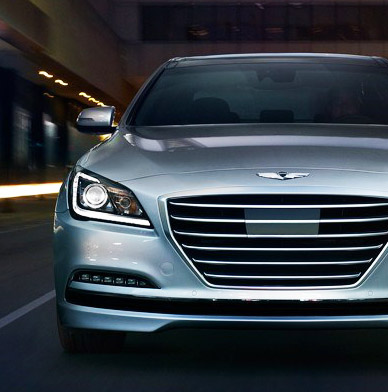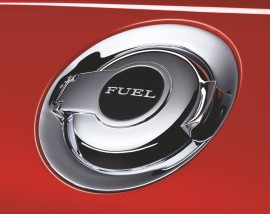Cost is often the first thing that comes to mind when motorists think of gasoline. Many will drive halfway across town to save a couple cents per gallon. Additionally, purchasing regular-grade fuel to save money can be an exercise in false economy, especially if your vehicle is designed for premium gas.
Running fuel with insufficient octane can cause internal engine damage, which isn’t pretty. “The worst case scenario …. You could actually [melt] holes in the pistons and cause catastrophic damage to the [connecting] rods,” said Bill Studzinski, GM powertrain fuels group manager. Fortunately a disaster of this caliber is unlikely in today’s highly tuned, computer-controlled powerplants. Still he said, “You should follow the owner’s manual guidance.”
What’s more apt to happen when there isn’t enough octane is a phenomenon called spark knock. John Juriga, director of powertrain at the Hyundai America Technical Center described this abnormal combustion as “sort of a high-pitched pinging,” or perhaps even a rattling noise. This sound is caused by colliding flame fronts inside the combustion chamber, which lead to pressure spikes and ultimately that telltale sound. “Obviously knocking is not something customers like to hear,” he said, nor is it good for your engine.
Octane Requirements
Octane is a measure of gasoline’s resistance to igniting under pressure. To improve fuel economy and output figures, manufacturers often increase the compression ratios of their engines, that is, how tightly they squeeze an incoming air-fuel mixture. A lower-octane fuel is more likely to spontaneously ignite than one with a higher rating. For these reasons and more, performance vehicles or ones equipped with forced induction often demand premium.
SEE ALSO: What is Octane?
Studzinski said GM has two different fuel requirements. In some of their cars and trucks high-octane gasoline is recommended, in others it’s mandatory. Of course many of their vehicles are designed to happily burn regular gas.

These cars are able to adapt to various octane levels. Juriga noted that they’ve allowed “the engine to sort of regulate itself.” Knock sensors detect any pinging and tell the powertrain-control computer to dial back spark timing to eliminate it.
Juriga said more advanced ignition timing – having the spark plug fire earlier – improves both low-end torque and high-RPM power, which is why automakers try to push it forward, though there is a practical limit.
Curiously, high-octane gasoline isn’t always the same from one market to another. “The petroleum industry has decided to sell premium as two different grades,” said Studzinski. East of the Mississippi River it’s rated 93 octane, west merely 91. Fortunately either should work.
“For General Motors in 2015, and previously, we always defined premium as 91 AKI or higher,” noted Studzinski. That three-letter initialism stands for anti-knock index, which is “the posted octane on the pump.”
Cheapening Out
What if you drive a vehicle that recommends premium fuel and you decide to save a few bucks and fill the tank with regular-grade gas? Studzinski said, “You won’t damage your engine but the following are the side effects: acceleration will be poor … and [a] loss of fuel economy.” This could be an instance of being penny wise and pound foolish.
Conversely if your car is only designed for 87 octane buying the expensive stuff may do little more than increase your costs. “Putting premium fuel in our vehicles most of the time won’t make a difference,” said Juriga, adding that these cars typically have spark-advance curves that are tuned for regular gasoline and can’t advance enough to take full advantage of the extra octane.
When to Step Up
In spite of this Juriga also said, “There could be a time when it’s beneficial [to step up a fuel grade].” For instance, if you’re driving through Death Valley and its 120 degrees out your vehicle’s powerplant is going to be ingesting very hot, dry air, a combination that can exacerbate the propensity for spark knock. “In that particular case the premium fuel would benefit,” he said, because the engine is going to be retarding timing to prevent knock and as a result performance will suffer. Higher octane can serve as a stopgap to prevent this.
Additionally Juriga said pinging is likely to occur at both low and high engine speeds while under heavy load. Typically “midrange [operation] is not a problem.” Keep this in mind if you tow or haul; extra octane might help with performance, especially if it’s sweltering outside.
“If you were to hear knocking or feel really sluggish acceleration you should try moving up an octane grade,” concurred Studzinski. “Under certain conditions you may need to.”
Mistakes Happen
Human error is unavoidable. If your vehicle requires premium fuel and you mistakenly put regular in the tank it’s probably not the end of the world.
Juriga said most automakers should have robust enough tuning that nothing catastrophic would occur. “I’m going to have no concern that I’m going to trash my engine,” he said, as long as it was operating in normal conditions. When it comes to something super exotic like a Ferrari he’s not certain if this would still be the case.
SEE ALSO: Which Stations Sell the Highest-Quality Gasoline?
Studzinski said as an engine compensates for lower octane it pulls spark timing and runs a richer air-fuel mixture. “You could throw more heat into the exhaust and [might] damage your exhaust components,” he said, chiefly the catalytic converter but, “Each OEM does it differently.” Do I Really Need Premium Gas?
Topping-Off the Tank

Still, if your vehicle is tuned for regular-grade gasoline, “It does not benefit you, in most cases, to put premium fuel in,” said Juriga. Keep that in mind the next time you fill up.
For more stories like this one check out our Tips and Advice Section.










